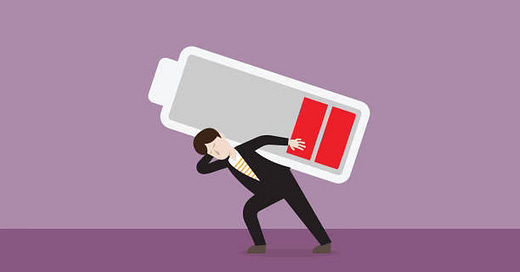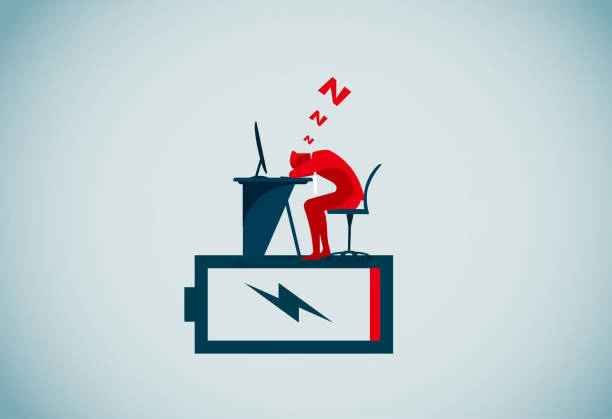TIREDNESS and FATIGUE in ITP and CHRONIC ILLNESS
Tiredness and Fatigue is the subject which always comes up on the ITP Support Association social media platforms, online support groups and our annual convention.
Well I am living with ITP and Fibromyalgia, no wonder I run our of steam now and again.
Tiredness /fatigue is a key symptom of ITP and Fibromyalgia but it is less easily recognised because there is no physical evidence to explain it and no simple way to measure it. Many people will often say to me - “But you don’t look ill “ , when at the same time I can barely keep awake.
Fellow sufferers will know that it is more than fatigue, it’s like your batteries are suddenly removed. It’s turbo torpor, supersonic stupor and bloody annoying. You suddenly fall into a sleepy hollow !
So what can we do about it ?
There are many things that we can do to help combat fatigue. That said, not all of the following things will result in a completely Duracell powered life even if you do them all. There is no magic solution or silver bullet.
It’s all a matter of staying curious about trying different things and we can still live a highly productive and enjoyable life by adapting to our new normal.
Many of the suggestions will be effective for one person but may not work as well for others. It’s all a bit trial and error ( where have I heard that before ? )
After 19 years of living with ITP and 3 years of Fibromyalgia here are a few ideas.
The following things all play a part in my daily routine and seem to help me. But with all that I am still willing to look at other alternatives and remain open to change as needed.
BUT I emphasise and here’s the disclaimer -
This post shares my personal experience and should not be taken as medical advice. Please research your options thoroughly and seek professional advice, where appropriate, before making changes to your routine, medications or supplements.
It is important to discuss your own individual medical situation with your specialist /doctors first before making any changes to your routines/diet/exercise etc.
So we start in the land of nod -
SLEEP
1. Go to bed and get up at a regular time if you can. Try to follow the same sleep routine every night. Good sleep is vital, allowing our bodies to rest and repair.
In Fibromyalgia (in very simple terms) because our brains are over active many of us fail to get enough “restorative” sleep, the stage of sleep that allows our systems to repair and recover, hence we are often tired and unrefreshed.
2. Do some mental and physical exercise during the day, especially late afternoon or early evening as it should help you sleep.
3. Only take a short afternoon nap if it doesn’t interfere with your sleep at night.
4. Avoid dozing in front of the TV in the evening. Try reading, listening to music, or writing. And don’t overuse computers, tablets, mobile phones or over engage with social media. They stimulate the brain and prevent us from winding down towards day’s end.
5. Keep your bedroom dark (seems obvious but always close the curtains or blinds).
6. Make sure noises in the house during the night are minimised. Switch off electrical appliances that hum, buzz or disturb you. Turn off TV’s, mobile phones, lap tops, iPads well before you go to bed.
7. Make sure your bedroom is not too hot.
8. In the evening avoid anything with caffeine. Don’t eat anything heavy for a couple of hours before you go to bed and avoid too much alcohol.
9. Try to keep calm if you really cannot sleep.
10. If you are going to be awake don’t keep tossing and turning, get up and read for a while, then go back to bed and try to drop off.
Eating fresh food, in season and prepared by you has so many health benefits.
EATING HEALTHILY
1. Eat a good, fresh, well balanced diet. It gives your body the best chance to fight fatigue & helps your body in many other ways.
2. Eat a good mix of protein, carbohydrates, fresh fruit and vegetables. We are all different and may have other medical issues in addition to our ITP. It is important to discuss your diet and any changes you might make with your doctor or specialist.
3. With ITP we must avoid quinine and any products that contain quinine. We also need to avoid aspirin, ibuprofen and any products that contain them.
4. Eat less salt, reduce fat and sugar intake. Check ready meals carefully as levels of salt, fats and sugars can be high. Eat less ultra processed food, ready meals and fast foods.
5. Drink plenty of water. Dehydration causes many health problems including kidney stones, kidney infections, urinary tract infections. Dehydration makes you feel lethargic, tired, fatigued. Six to eight glasses of fluids per day, water is best and in hot weather we need to drink even more.
6. Avoid too much caffeine. It is in many drinks, not just coffee & tea. It is in cola for example. Caffeine keeps you awake and also prompts you to urinate more so dehydrates you. It is also a stimulant and increases the heart rate amongst other things.
7. Being overweight increases fatigue and has other health risks. Avoid snacking and too much sugar. Reduce fats and processed food like ready meals, take away foods - burgers, pizza, fried chicken. Eat more fresh fruit and vegetables .
8. Cook your own meals. Preparing and cooking your own food YOU know what is going into it. YOU control the amount of fats, sugars, salts that you are eating.
9. Greens….For us ITP folk green vegetables and fruits are very helpful. So spinach, kale, cabbage, lettuce, broccoli, apples and pears are very helpful in boosting the health of our immune system. Greens contain plenty of Vitamins A, C, E, and K. (they help in the clotting process).
REDUCING STRESS
1. In the modern world, it is virtually impossible to eliminate all stress. We do actually need a some stress to function properly. BUT it is being able to control, manage and limit stress that is key. Have a look at your STRESS BUCKET (See links at the end of the article)
2. Include some relaxation every day. Try to go out and walk every day. Getting some fresh air is so beneficial, it clears the mind and helps our physical well being. It helps joints and muscles, and has many other benefits.
3. Take time every day for YOU. Listen to radio, music, read, have a warm bath, talk to family and friends, go to the movies, take up a hobby, go to a museum, visit a gallery. Do some meditation and/or breathing exercises. DO SOMETHING !
4. Turn OFF PHONES, computers, iPads, gadgets, tablets. Have some down time. Be unavailable for at least a while every day. NOTHING is more important than YOU. The World can wait occasionally.
5. Pace yourself, be realistic about goals you set. Look for small wins, marginal gains. Try the SPOON THEORY (see links at the end of the article).
6. Stay in regular contact with family and friends and share your feelings with them. Fatigue and stress are invisible to others so talk to someone about it.
7. Avoid stressful situations and negative people. It sounds ridiculous but sometimes the smallest word is one that is the most difficult to use. The word is NO. Sometimes for your own good say NO.
8. Along with saying NO, keep a planner. Make sure people around you know what that planner consists of. Don’t allow people to steel your time. Be clear what you want to do and when. YOU have to MANAGE it or it will MANAGE YOU.
9. Plan properly. The old adage of “failing to plan and planning to fail” is the truest of them all. Plan well and know what success is, know what you are aiming to do, when you are aiming to do it by, how you are going to do it and know when you’ve achieved it. (ie set SMART GOALS).
10. Don’t be afraid to ASK for help. So many people take everything on themselves and forget that a problem aired is a problem shared. ASK - there is no such thing as a stupid question, just a stupid person for not asking it !
11. Tell your doctor, ITP specialist, consultant if you are feeling stressed, fatigued, tired. You would tell them if you have a nosebleed or bruise so tell them about stress, fatigue and tiredness.
12. Join in with ITP local group meetings and social media forums. The ITP Support Association have regular local and national meetings and platforms on Facebook, You Tube, Twitter and there is also the ITP Support Association HealthUnlocked group.
13. Get a little bit of sun. It is essential for supplying our Vitamin D requirements and a lack of it can exacerbate fatigue and feelings of tiredness.
WARNING - Too much sun has other negative effects so be careful . Skin cancer is a major concern. Our daily Vitamin D requirement is fulfilled by just 10 to 15 minutes exposure to the sun here in the UK during the Summer months (May to September).
Getting some exercise like taking a walk in nature has so many benefits.
EXERCISE
1. Many studies confirm that exercise boosts energy levels. It improves the efficiency of your heart, circulatory system, lungs and muscles and is good for the brain. It aids flexibility and helps prevent obesity and the negative health issues that may arise from it.
2. You don’t need to do too much. We are all different in what we can do . Be sensible, start slowly and discuss any plans you have to start exercising with your doctor or specialist first
3. Regular light exercise is proven to be beneficial to combating fatigue. Just a short walk every day is a great start, especially in nature.
4. Cycling and swimming are great alternatives to walking or jogging.
5. Don’t sit too long. Even if you move around in the garden cutting the grass, picking up leaves, just pottering around, it is all helpful.
6.Getting some fresh air , especially in nature will help to relieve stress, improve your sleep and reduce tiredness.
Get creative, take up a creative hobby like painting, writing, music, gardening, knitting, sewing - It helps our health in many ways, especially reducing stress which is fatigue inducing.
Many of these suggestions are common sense and probably things we all think that we are already doing.
The most important thing is that it should not become too onerous because if it is then you will not stick to it. You have to make it fun, simple and really want to do it.
Good luck and best wishes.
Now I’m going off for a nap !
FURTHER INFORMATION
SLEEP MATTERS -
Sleep Matters: The Impact Of Sleep On Health And Wellbeing | Mental Health Foundation
STRESS BUCKET -
https://mentalhealth-uk.org/blog/the-stress-bucket/
THE SPOON THEORY -
https://www.gwh.nhs.uk/media/rk2krmbw/fatiguemindmaptrifold1604.pdf
WATER, DRINKS and HYDRATION -
NHS EATWELL GUIDE -
https://www.nhs.uk/live-well/eat-well/food-guidelines-and-food-labels/the-eatwell-guide/
NHS - EVERY MIND MATTERS - How to recognise and cope better with Stress-
https://www.nhs.uk/every-mind-matters/mental-health-issues/stress/
FOOD FOR LIFE - Book by Tim Spector
https://www.penguin.co.uk/books/435986/food-for-life-by-spector-tim/9781529919660
INSIGHT TIMER - BREATHING , MEDITATION, MINDFULNESS -
https://insighttimer.com/en-gb
SMILING MIND - BREATHING, MINDFULNESS -
https://www.smilingmind.com.au
BALANCE - BREATHING, MEDITATION, IMPROVING SLEEP -
https://balanceapp.com
GROW MODEL for SMART GOAL SETTING -
https://www.mindtools.com/an0fzpz/the-grow-model-of-coaching-and-mentorin
WHY CREATIVITY HELPS OUR HEALTH -
How do creative hobbies benefit your health?
FATIGUE IN ITP -







Fatigue is a constant companion.
A very helpful read.